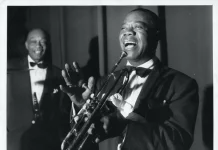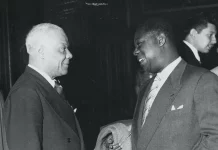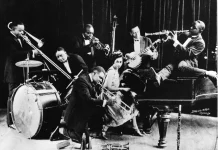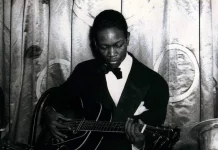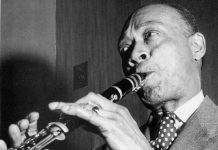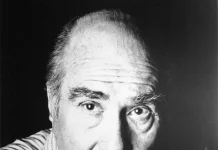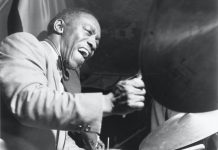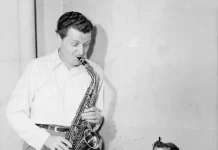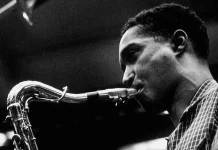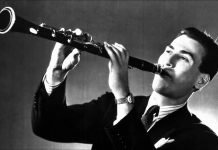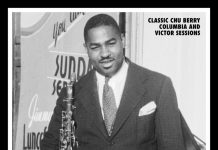“I must confess to getting more joy from previously unissued material by Buck, Pres, Hawk, Zoot, Getz, Hodges etc. than hearing some brilliant new wunderkind who has apparently just burst on the scene. (Well, I shall be 83 in nine days’ time and feel entitled to be a crotchety old sod, if I feel like it.)” – letter from Alun Morgan to the writer, 15 February 2011.
*************
It seemed distinctly odd to have a function attended by 600 people at the Los Angeles Ambassador Hotel to celebrate Leonard Feather’s 40 years in jazz. Steve Allen, who probably disliked Feather, was asked to speak. Patricia Willard, in her report, noted what he said.
“Some people have put Leonard down for not having the world’s most exciting personality”, he said. “What can you expect from a guy whose birthstone is lint? Anyway, we’d like to thank the wax museum for allowing Leonard to join us this evening.
“Quite seriously, despite all the jokes and nonsense of this evening, Leonard is an admirable man. He plays no favourites. He plays his own stuff a lot.
“Maybe there are some young people in the audience who don’t know that Leonard is a professional musician, pianist and composer. He used to work here in town in some of the smaller clubs with a two-man group, just a piano and drums – and, honestly, it didn’t work out too well because Leonard kept on going out front to see how the band sounded.
“Leonard’s success has not changed him and that certainly is a shame”.
*************
“Everybody ought to listen to Benny”, said Miles Davis. “He’s a whole musical education. Benny Carter lived a fuller life than any of us will. He easily survived John Hammond’s assessment of him in his autobiography John Hammond on Record.
Benny died on 12 July 2003, a couple of weeks before his 96th birthday, a year after having passed a driving test that enabled him to continue driving his two beloved Rolls Royces around Los Angeles
“He tried to do too many things at the same time”, wrote Hammond. “Not content to be a great alto saxophonist, he also had to be an arranger – and of course, he was a top arranger – and a trumpet player. He was not a top trumpet player. He was more interested in those years in exhibiting his versatility than in making great music, and I believe this is one reason Benny never became a great bandleader. I invested a deal of money in Benny’s career, but money was not enough”.
Last month I mentioned the fall-out between Benny Carter and John Hammond. The two mentioned their “friendship” on several occasions, but it might perhaps have been better described as an acquaintanceship.
Benny died on 12 July 2003, a couple of weeks before his 96th birthday, a year after having passed a driving test that enabled him to continue driving his two beloved Rolls Royces around Los Angeles.

Hammond (pictured left) was raised in surroundings of overweening wealth and did many good things for jazz. But along with his benign actions came an assuming of authority. He decided that he knew what was best for jazz musicians and most of them, knowing where the money was, took his counsel meekly. It was not a good idea to do otherwise.
One who didn’t conform to the edicts was Rex Stewart.
It was odd that Hammond, an American, first became interested in jazz whilst on a trip to England in 1923, when hearing Sidney Bechet play in London.
In 1931 Hammond missed most of a term at Yale because of jaundice. Rather than repeating his studies, he dropped out of the university. It was then that he began writing a unique series of reviews of jazz events for British papers. Although only 21, his influence on the New York jazz scene, supported by his family money, burgeoned rapidly.
It was also in 1931 that nine boys, aged between 13 and 20, were falsely accused in Alabama of raping two white women on a train. They became known as the Scottsboro Boys, and in various ways each of them was to suffer or die over the next few decades. They suffered several trials, and it was generally believed among clear-thinking people that they were innocent. A multitude of benefits was organised for the lads, but these became complicated because of strong Communist involvement in several of them. Communism was one of the great controversial questions of the day.
Hammond organised one for them at New York’s Rockland Palace (where, incidentally, Charlie Parker was recorded in 1952 for an LP). Although Rex was working for both the Fletcher Henderson band and McKinney’s Cotton Pickers at the time, Hammond asked Rex Stewart to put together a band to provide the music for the evening, but Rex declined because he was frightened of the risk to his career from the left-wing association.
“Because of that John Hammond had me black-listed”, Rex told me. Because of his independent attitude, this was a fate that Rex suffered from more than one promoter.
Instead, Hammond persuaded Benny Carter, whose band was adorned by Dicky Wells, Bill Coleman, Sid Catlett, Chu Berry and other embryo stars, to give his services free.
Carter still had strong links from his work as a sideman with Fletcher Henderson. Fletcher was notoriously haphazard and when he was double-booked in December 1932 and January 1933 Benny “lent” his band to Fletcher, sitting as a sideman in the section of his own band whilst Fletcher led it. Carter’s band was so good that one of the people that had booked it told Fletcher that he had never heard his band play anything like as well before.
Benny deviated from Hammond’s advice, and John wrote in one of his Melody Maker reports that “Occasionally Benny Carter can make me very tired”. Such frankness in print began to proliferate, and finally Benny responded in his own published writing, suggesting that Hammond was not perhaps as smart as he thought, having made mistakes in identifying Benny’s sidemen on his records. Later, in his autobiography published during the 1970s, John Hammond regurgitated some of the earlier disputes, provoking Benny to write a letter to Downbeat refuting what he regarded as slurs.
A key one of them seemed quite trivial. In 1933 Hammond had heard Teddy Wilson on a radio broadcast from Chicago. He recalled suggesting to Carter that he should go to Chicago and bring the pianist back to join his band. He remembered giving Carter $150 to do so. Carter, on the other hand, remembered that he’d first heard Teddy in 1933 when Roy Eldridge had persuaded him to go to hear the Speed Webb band in which the young pianist was working. Benny remembered mentioning Teddy to Hammond years later when he had thought of enrolling Teddy. It was then that Hammond loaned him the $150. Hammond wrote in his book that he had “invested a deal of money in Benny’s career. In the Downbeat letter Benny said “I don’t recall that he invested any money in my career and I wonder what his evidence is for this statement”.
Count Basie had fitted in well with John Hammond’s schemes, but, as well as Carter, Benny Goodman and Duke Ellington had both had occasion to rebuff Hammond’s attentions.
*************
While Duke Ellington was often happily casual about his band and his music, many of his admirers were not so. I’m here to testify that a bite from a Duke Ellington devotee can rank with that of a Doberman Pinscher. I was once thrown out, ostracised and banned for life by the president of the main society for Ellington enthusiasts. My offence? I’d ridiculed what I saw as their extreme pedantry. This was all so long ago that I forget the detail. Somebody had written that some Ellington event had taken place on a Tuesday, when in fact it was on the Thursday – something like that. I wrote that all the members stayed home with the blinds drawn on the day that the cataclysmic error was discovered. The head of the organisation immediately and with loud fanfare and big capitals, excommunicated me.
So I know how Billy May felt.
I’ve always managed to enjoy the separate worlds of Duke and Stan, but my Kenton pals like Michael Sparke and Bobby Lamb have no time for Duke’s music, and Duke’s enthusiasts can’t abide Stan’s music in any form.
Billy wrote several albums for Frank Sinatra when Frank acquired control of Reprise. Frank had Duke under contract and he asked Billy to write an album of vocals to be accompanied by the Ellington band. May wrote a perfectly good set of charts, but the Ellington bandsmen, many of whom were not good readers, were used to the idiosyncratic ways of the Duke, who was in the studio while Billy rehearsed and recorded.

“The trumpet section really wasn’t making it on the recording session”, Billy remembered. But it wasn’t my place to say so. ‘Let’s try it again’ was all I could keep saying. May (pictured right) noticed that throughout the session one of the trumpeters was reading a book on cameras. The album was not a success.
By coincidence, shortly after writing this I was listening to Paich’s “The Big Chase” and some of the Johnny Richards arrangements on Back to Balboa by Kenton. It came home forcefully how hopelessly the Ellington men would have floundered if asked to play these charts. I’ve always managed to enjoy the separate worlds of Duke and Stan, but my Kenton pals like Michael Sparke and Bobby Lamb have no time for Duke’s music, and Duke’s enthusiasts can’t abide Stan’s music in any form.
*************
Lounging in his bath in an Amsterdam hotel after playing a concert with Woody Herman, Red Kelly fell asleep. As a bassist he didn’t want the skin on his fingers to become soft, so he had left his arms dangling outside the bath. He had been reading the Sunday newspaper at the time and during the night the colours seeped out of the comic section and dyed the bathwater a murky red. The maid came in to clean up the next morning, found Kelly and thought he was dead. She ran from the room, screaming at the top of her voice.
When he retired, Kelly and his wife Donna ran a restaurant and night club in Tacoma, Washington. On the club’s bandstand Kelly put a notice that read “Go some place else and get discovered, and then come here”.

